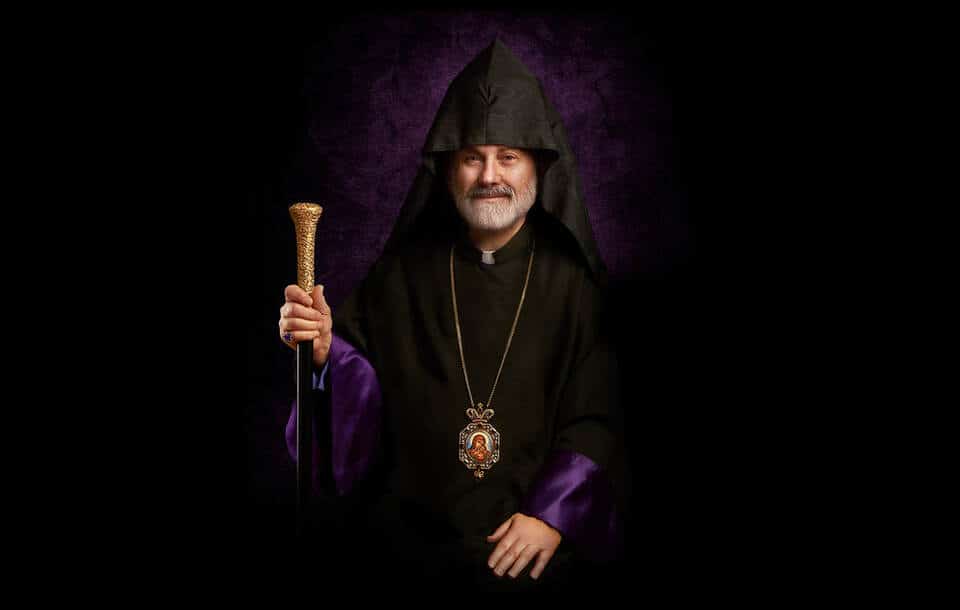The Prelate’s Message, May 2
Today, according to the Calendar of the Armenian Church, is dedicated to the Apparition of the Holy Cross which appeared across the heavens above the Mount of Olives, bringing us the powerful message that the Cross is not only a piece of wood, designed by men for torturous punishment and death, raised on Mount Golgotha, but rather a revered element in the Divine Mystery for the salvation of Mankind.
Today’s reading from the Scriptures is from Saint John. The Evangelist describes that in the middle of the festival, Jesus went up into the Temple and began to teach. The Jews were astonished at it, saying, “How does this man have such learning, when he has never been taught?” Jesus answered them, “My teaching is not mine but His who sent me. Anyone who resolves to do the will of God will know whether the teaching is from God or whether I am speaking on my own. Those who speak on their own seek their own glory; but the one who seeks the glory of Him, who sent Him, is true, and there is nothing false in Him” (Jn 7:14-23). After reading these life-giving words, let us open our hearts to enjoy the teaching of this phenomenal Teacher.
- Once again, we are so grateful to the Church Fathers who, when compiling the New Testament, led by the Holy Spirit, did not depend upon one Gospel only, as it has been questioned through the early church sectarians. In today’s reading, we find a tiny detail which justifies this approach. To follow a precise chronology was not the intention of the Evangelists, for their ultimate goal was to share the Good News of the Risen Lord. Nevertheless, while the three, Synoptic Evangelists, Matthew, Mark, and Luke, refer to just one Passover, the final feast before the Betrayal of Jesus, Saint John describes three Paschal feasts (Jn 2:13; 6:4; 18:39) as well as the Festival of the Tabernacles. The three years of the earthly mission of our Lord Jesus Christ chronologically becomes more factual in the Gospel of Saint John. Moreover, as we were informed in today’s Scriptural reading, Saint John refers to the Feast of the Tabernacle in an interesting way. In 7:10, we are told about the beginning of the Festival, when the brothers of Jesus go to the celebration while Jesus goes separately and secretly. In 7:14, in the middle of the festival, Jesus goes up into the Temple. In 7:37, on the last day of the festival, Jesus solemnly announces: “Let anyone who is thirsty come to me.” The feast of the Tabernacles, also known as the Booths, stands for the Deliverance of Jews from the captivity in Egypt. In human understanding, Time has three tenses: Past, Present and Future. Hence, within the context of the Feast of the Tabernacle which was the shadow of the Redemption of mankind in Jesus Christ from the captivity of sin, all three qualities of Time are presented: Past, Present and Future. Humanity discovers salvation in our Lord Jesus Christ, who is the Beginning (Alpha), the Continuation (Delta) and the Fulfillment (Omega)of Life.
- The question by the people, “How does this man have such learning?” is indeed amazing. We are reminded by the confession of Nicodemus: “Rabbi, we know that you are a teacher who has come from God” (Jn 3:2). Saint Matthew narrates how the Magi worshipped Him at His birth (Mt 2:1-12), and the Centurion at the Crucifixion exclaimed “Truly this man was God’s Son (Mt 27:54). When we combine all these details we may conclude that those who come to Jesus with an open mind and heart, from different walks of life, encounter the Divine presence in Jesus, who is the source of all wisdom and Teaching.
- God’s Will and Teaching are interrelated and complimentary with one another. God’s will is revealed through the Creation as well as through His Ordinance. He has provided us with two major means by which to reach Him. First, we reach Him by observing the Complexity and the Order as well as the Majesty and the Infinity of the Creation. Second, we reach Him by studying and exploring His commandments, through them, recognize the will of the Ultimate Maker and Sustainer, thus, gratefully express our admiration. By adhering to His Commandments, we actualize His will, and in turn, when we follow His will, we understand His Teaching. Therefore, in the spirit of the Resurrection, by embracing God’s Will and Teaching, humanity redirects its course from life to Life.
- Continuing His discourse, Jesus says: “Those who speak on their own seek their own glory; but the one who seeks the glory of Him, who sent Him, is true, and there is nothing false in Him.” By this statement, our Lord draws the crucial difference between those who are the true ambassadors of God like the prophets, and those who are the spokespersons of their own wisdom, self-interests and vain glory. Without God, any dream can be doomed, for we should be aware that the Evil One seeks only his vain glory; hence, by misleading us with false promises of earthly glory, we serve the Evil One unconsciously and thereby inflate his vanity. Whenever we dissuade the Evil One’s interference in our life, we are preventing further entrapment in his subtle snares.
Jesus always refers to God while teaching and performing miracles. By choosing to adhere to God’s will, we will never lose our identity or personality. Instead, God rises and glorifies us more than all of our merits and achievements might offer to ourselves.
With this teaching anchored in God’s will, let us sustain our earthly life, and be found worthy to enjoy just a glimpse of His eternal glory which Saint Paul has concludes that “no eye has seen, nor ear heard” (1 Cor 2:9), and with all the saints who have done God’s will, let us praise the Redeemer of humankind. Amen.

